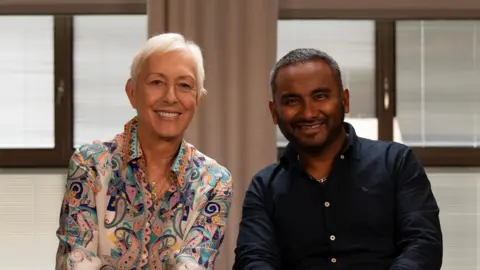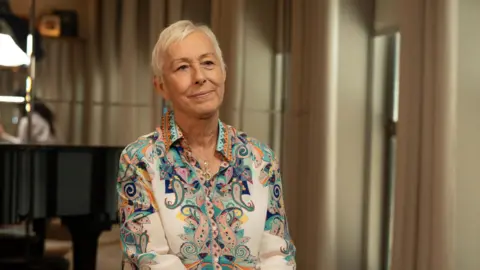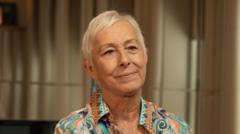
 BBC
BBC
Fifty years ago, Martina Navratilova left everything she knew in communist Czechoslovakia to start a new life in the US.
Then an 18-year-old high school pupil, she was one of the Cold War’s most high-profile defectors – and she would go on to become one of tennis’s most iconic players.
But speaking to the BBC’s Amol Rajan, she says that she fears the US now “wouldn’t let me in”.
“I’m not loyal to [US President] Donald Trump,” she says, adding that she worries the US has become a “totalitarian” state.
Since President Trump took office in January, his administration has carried out sweeping immigration raids, sparking protests in parts of the country. He has also instituted a travel ban for citizens from 12 countries, and there have been reports of tourists being detained at the border.
“If I were now still in that same position [as in 1975] and I had to go live somewhere, it would not be America, because it’s not a democracy at the moment,” she says.
When she speaks about US politics, Navratilova’s frustration is palpable. She believes people haven’t noticed what she says is a situation that is gradually getting worse.
The US, she adds, is “definitely turning against migrants”.
“I mean, people are getting chucked out by Homeland Security, they’re getting chucked out because they’re not on board completely with Donald Trump’s agenda… because they’re not kissing the ring,” she says.
That decision to defect to the US in 1975 wasn’t an easy one to make, she says. She describes having an “idyllic” childhood growing up in Revnice, in modern-day Czechia, with a loving family that she was leaving behind. “I never knew when I would see my parents again – or if I would see them.”
But doing so changed the course of Navratilova’s life. She told a press conference at the time that she left Czechoslovakia because she wanted to become world number one in tennis – and that she “couldn’t do it under those circumstances at home”.
She did indeed go on to become number one – both in women’s singles for 332 weeks, and women’s doubles for a record 237 weeks. She is now widely considered to be one of the world’s greatest tennis players.


Navratilova is a dual US and Czech citizen, and still lives in the US with her wife, model Julia Lemigova. Does she worry that, in the current political climate, she could lose her own citizenship?
“Everything is up in the air right now, and that’s the whole point. Everybody’s walking on eggshells, not knowing what’s going to happen.”
There is, however, one extremely divisive subject on which she has previously said she agrees with President Trump – transgender women’s participation in sport.
Navratilova is firm in her belief that the inclusion of trans women in women’s tennis is “wrong”.
She says she doesn’t agree with current World Tennis Association (WTA) rules, which state transgender women can participate in women’s games if they provide a written and signed declaration that they are female or non-binary, that their testosterone levels have been below a certain limit for two years, and that they sustain those levels of testosterone.
She says she feels trans women have biological advantages in women’s sports – a belief that is hotly debated.
“There should be no ostracism, there should be no bullying,” she says, “but male bodies need to play in male sports. They can still compete. There is no ban on transwomen in sports. They just need to compete in the proper category which is the male category. It’s that simple.”
She adds: “By including male bodies in the women’s tournament, now somebody is not getting into the tournament – a woman is not getting into the tournament because now a male has taken her place.”
In December last year, Britain’s Lawn Tennis Association changed its rules, meaning transgender women can no longer play in some female domestic tennis tournaments.
And in April, the UK’s Supreme Court ruled that the legal definition of a woman is based on biological sex. Asked if she felt tennis should follow the lead of the UK court, she says: “100%”
Pushed on whether we should “spend a bit more time being sympathetic to” trans people, Navratilova replies: “Very sympathetic – but that still doesn’t give them a right to women’s sex-based spaces.”
‘Oh my God, I’m going to die’
Navratilova has been open about her battles with cancer over the last 15 years.
She was first diagnosed with breast cancer in 2010, at the age of 52. Then, 13 years later, it returned – along with a second, completely unrelated cancer in her throat.
“The way I found out, I went like this”, Navratilova says, smacking her hands on the sides of her face as if shocked by something. “And I’m like, ‘oh, this lymph node is a little bit bigger’. And a couple of weeks later, it’s still bigger.”
Following a scan, doctors also caught the second cancer in her breast.
“We got the results, and it’s cancer,” she says. “And I’m like, ‘Oh my God, I’m going to die’.”
Although she says the treatment was “hell”, she feels “all good” now.
“Knock on wood, all clear, and no side effects at all – other than red wine still doesn’t taste good, so I’ve gone sideways towards tequila and vodka,” she laughs. “I’m lucky. The cure was hell, but the aftermath has been great.”
Has having cancer changed Navratilova at all?
“Cancer taught me to really appreciate every day, which I was doing pretty much anyway,” she says. “But most of all, to not sweat the small stuff. It’s fixable.”
Amol Rajan Interviews: Martina Navratilova is on BBC 2 at 19:00 on 18 June, and on BBC iPlayer.







